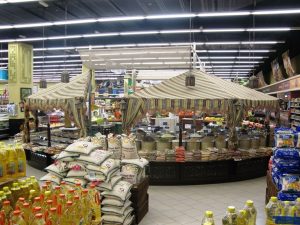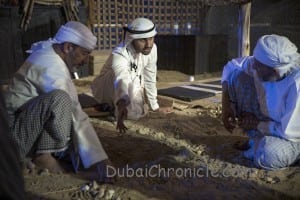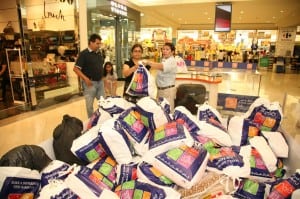The latest Ramadan consumer behaviour insights released by global market research company, YouGov, reveal a lower proportion of residents across the MENA region are spending more money during Ramadan in 2014 compared to last year. Specifically, 62% of online respondents agreed they spend more money during the Holy month, compared with 74% who agreed to the same statement in 2013.
The survey, conducted using the company’s market-leading Omnibus online research service, recorded over half of the online respondents surveyed across the region said they only make essential shopping trips for items they really need during Ramadan, and 15% said they don’t shop at all. In addition, when asked, a significant 57% said ‘increased prices’ were one of the negative aspects of Ramadan in MENA.
Food & Beverage Insights
 When looking more closely at eating and drinking habits during Ramadan, of the 9 in 10 Muslim respondents who said they fast during Ramadan, half still feel ‘it is easy to fast’.
When looking more closely at eating and drinking habits during Ramadan, of the 9 in 10 Muslim respondents who said they fast during Ramadan, half still feel ‘it is easy to fast’.
Dates are very much still the favourable way to break your fast, with 68% of respondents choosing the traditional palm fruit – compared to 56% who chose it in 2013. An overriding majority (82%) also said they prefer to break their fast at home with their family.
It appears online respondents are divided when it comes to meal sizes during Ramadan. When asked about their types of eating habits, the largest proportion, (42%) said they prefer to eat a light meal/snack at Iftar time only. However, eating only a big meal at Iftar, or eating light snacks at Iftar followed by a big meal later for dinner, are equally as popular – each represented by 22% of respondents.
As for MENA’s drink of choice during Ramadan, water is the most favoured beverage (chosen by 70% of respondents), followed by juice (61%), coffee (25%) and tea (24%). Fizzy drinks and energy drinks were the least popular amongst residents chosen by only 8% and 2% of respondents respectively.
Lifestyle Changes
 When asked to what extent their personality or lifestyle changes during Ramadan, the proportion of online respondents who said their behaviour changes completely has reduced slightly, from a third in 2013, to a quarter (26%) in 2014.
When asked to what extent their personality or lifestyle changes during Ramadan, the proportion of online respondents who said their behaviour changes completely has reduced slightly, from a third in 2013, to a quarter (26%) in 2014.
Four out of five online respondents said their behaviour changes at least a little during the Holy month (similar to 2013). Almost two thirds (61%) said they pray more and half of the online sample (54%) agreed they spend more time with family during Ramadan.
The majority of online respondents spend more time at home during Ramadan (89%), especially females (95% compared to 86% males) and respondents aged 40+ (92%, vs. 88% of 18-29 year olds). Prayers and religious practices are the clear top of mind associations with Ramadan (66%). This is especially true among females (70% of whom agreed, vs. 63% of males).
Unsurprisingly, the most popular topics of conversation during the Holy month center around religion (60%), with music and movies being the topics avoided the most amongst Muslim respondents.
When asked which activities are inappropriate during fasting hours, as expected, listening to music (61%) and dancing (64%) were among the most frowned upon by Muslims. The highest percentage (68%) of online respondents said swearing was the most inappropriate activity when fasting.
Negative Aspects of Ramadan
 An overriding 60% of respondents expressed over-eating is a negative aspect of Ramadan in 2014. Although a clear majority (81%) said the reflective occasion is a good time for people to get healthy and 70% see it as an opportunity to lose weight, when asked, over half of respondents said they don’t partake in any sporting activity during Ramadan.
An overriding 60% of respondents expressed over-eating is a negative aspect of Ramadan in 2014. Although a clear majority (81%) said the reflective occasion is a good time for people to get healthy and 70% see it as an opportunity to lose weight, when asked, over half of respondents said they don’t partake in any sporting activity during Ramadan.
When considering behaviour at work during Ramadan, online respondents explained there were key issues surrounding the work place/school. Business inherently slows down during the fasting period – 42% said people turn up late for work, a similar proportion (40%) also highlighted people leave work early. Interestingly, 57% of respondents also said people have less patience at work during Ramadan.
It appears bad driving has marginally reduced in 2014 (35%) compared to the previous year when 40% chose it as a negative aspect of Ramadan.
Opportunities & Change
 As for the opportunities Ramadan presents, 91% said it’s a good time for people to learn about religion, 9 in 10 said it’s a great time for families to become closer and most (90%) agreed it’s a good opportunity for people to engage in charitable activities.
As for the opportunities Ramadan presents, 91% said it’s a good time for people to learn about religion, 9 in 10 said it’s a great time for families to become closer and most (90%) agreed it’s a good opportunity for people to engage in charitable activities.
When considering how Ramadan is changing in 2014, 7 in 10 said the Holy month is becoming more important and half (53%) suggested people are more generous during Ramadan now than they were in the past. Encouragingly, two in five (39%) said they engage in more charitable activities during Ramadan.
On the other hand, 64% of online respondents agreed that the spiritual meaning of Ramadan has been lost and three quarters (74%) felt Ramadan is becoming more commercial.






















![The Square at Nad Al Sheba Gardens Now Open hope tax season treated you well! Just checking in—ready to refocus on growing your business? I remember how we discussed scaling your [specific aspect of their business, e.g., online presence] but paused due to time constraints. We now offer a streamlined 6-month plan that delivers real results without adding to your workload. Let me know if you'd like to chat—I’d love to help you pick up where we left off!](https://www.dubaichronicle.com/wp-content/uploads/2024/11/The-Square-5-218x150.jpg)









